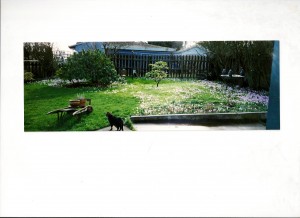I got interested in George Orwell because I was looking for something to listen to in the car that was not music—something to give my ears a rest. At the library I noticed a series of lectures on disc called The World of George Orwell. I thought, “He has a world?” Actually we all do, but as a writer he has given us entrée into his.
In one of his earliest essays– and a small masterpiece– called A Hanging, he describes an incident from his days as a policeman in Burma. As the prisoner is being led to his death, he steps aside to avoid a mud puddle. In that action Orwell suddenly has a realization that they are about to take away the life of a healthy, conscious man. “. . .in two minutes, with a sudden snap, one of us would be gone—one mind less, one world less.”
I loved his acknowledgement that a mind is a world. Reading Complete Essays I found George Orwell’s world refreshingly hard to classify. I had running and unanswered questions as I read. He talks with approbation about Marx. Is he Marxist? No. Communist? No. He writes for leftist publications and talks about socialism but is he a Socialist? Not really. Feminist? Hardly. He was apparently “awkward” around women and he did not think himself attractive to women. On the other hand he married a woman who was intelligent, independent and beautiful—as nearly every Eileen is.
He’s not any kind of an “ist.” Two consistent strains are his intense dislike of Totalitarianism and of the Catholic Church, seeing the latter as an institution of the former. A phrase that Orwell uses a lot is “a society of free and equal human beings.” What gets us there defies labels. In The Lion and the Unicorn: Socialism and the English Genius he says, “It is the liberty to have a home of your own, to do what you like in your spare time, to choose your own amusements instead of having them chosen for you from above.” I think he didn’t go in for dead “isms.” He liked language that breathed.
I love his Englishness. It’s an Englishness influenced from the bottom up, not the top down. Orwell didn’t go to Oxbridge. He lived among the homeless. He’s English before American culture infiltrated English society so he’s writing to English people who know what it means to do physical jerks (calisthenics) or to “guy (ridicule) an official” or to “fetch up” something in his mind. Every so often he says that someone or something is “not worth powder and shot.”
He has lovely descriptions for Americans whose DVRs hunt PBS: “. . .the beer is bitterer, the coins are heavier, the grass is greener, the advertisements are more blatant. The crowds in the big towns with their mild, knobby faces, their bad teeth and gentle manners. . .the clatter of clogs in the Lancashire mill towns, the to-and-fro of the lorries on the Great North Road, the queues outside the Labor Exchanges, the rattle of pin-tables in the Soho pubs, the old maids biking to Holy Communion through the mists of the autumn mornings. . . .It is a culture. . .somehow bound up with solid breakfasts and gloomy Sundays, smoky towns and winding roads, green fields and red pillar boxes. Moreover it is continuous, it stretches into the future and the past, there is something in it that persists, as a living creature.”
Then he turns over the stone: “. . .it resembles a family, a rather stuffy Victorian family, with not many black sheep in it but with all its cupboards bursting with skeletons. It has rich relations that have to be kow-towed to and poor relations that are horribly sat upon, and there is a deep conspiracy of silence about the source of the family income.”(The Lion and the Unicorn: Socialism and the English Genius.)
The essays are full of nuanced observations, and dry, throwaway, funny lines. Make yourself a pot of tea (as per the Orwell essay A Nice Cup of Tea) and read on:
Politicians and politics. Insert whatever name you want:
*“. . .I saw in Picture Post some stills of Beaverbrook delivering a speech and looking more like a monkey on a stick than you would think possible for anyone who was not doing it on purpose.” (As I Please 6, 1944)
*In a prosperous country. . .left wing politics are always partly humbug. There can be no real reconstruction that would not lead to at least a temporary drop in the. . .standard of life, which is another way of saying that the majority of left-wing politicians and publicists are people who earn their living by demanding something they don’t genuinely want. (Review of Union Now by Clarence K. Streit, 1939)
*Mr B. is not the most effective of the many guns now firing the counter-attack of the conservative party—indeed he is less like a gun than a home-made mortar with a strong tendency to blow up. . . (As I Please 29, 1944)
*Monomania is not interesting. . .no nationalist of the more bigoted kind can write a book which still seems worth reading after a lapse of years has a certain deodorizing effect. (Notes on Nationalism, 1945)
In the Midst of World War II:
*Racialism is. . .a way of pushing exploitation beyond the point that is normally possible, by pretending that the exploited are not human beings.
*Hitler is only the ghost of our own past rising against us. He stands for the extension and perpetuation of our own methods, just at the moment when we are beginning to be ashamed of them.
*I thought of a rather cruel trick I one played on a wasp. He was sucking jam on my plate, and I cut him in half. He paid no attention, merely went on with his meal, while a tiny stream of jam trickled out of his severed esophagus. Only when he tried to fly away did he grasp the dreadful thing that had happened to him. It is the same with modern man. The thing that has been cut away is his soul, and there was a period during which he did not notice it.
*Marx’s famous saying that ‘religion is the opium of the people’ is habitually wrenched out of its context and given a different meaning subtly but appreciatively different from the one he gave it. Marx did not say. . .that religion is merely a dope handed out from above; he said it is something people create for themselves, to supply a need that he recognized to be a real one. ‘Religion is the sigh of the soul in a soulless world. Religion is the opium of the people.’ What is he saying except that man does not live by bread alone, that hatred is not enough, that a world worth living in cannot be founded on ‘realism’ and machine guns?”(Notes on the Way, 1940)
*Why is the goose-step not used in England?. . . Military display is only possible in countries where the common people dare not laugh at the army.
*Over against the Nazi Storm Trooper you have got to set that typically English figure, the hanging judge, some gouty old bully with his mind rooted in the nineteenth century, handing out savage sentences. . .that evil old man in scarlet robe and horsehair wig, whom nothing short of dynamite will ever teach what century he is living in. . .
* In the years between 1920 and 1940 it (the decay of the British ruling class) was happening with the speed of a chemical reaction. . .a time came when stuffed shirts like Eden and Halifax could stand out as men of exceptional talent. As for Baldwin, one could not even dignify him with the name of stuffed shirt. He was simply a hole in the air.
*The British ruling class could not admit to themselves that their usefulness was at an end. . .Clearly there was only one escape for them—into stupidity. They could keep society in its existing shape only by being unable to grasp that any improvement was possible.
*. . .the naked democracy of the swimming pool. (The Lion and the Unicorn: Socialism and the English Genius, 1941)
*A column about how shortages and rationing had democratized clothes, he goes on about men’s evening dress:
“. . .hedged around with all kinds of petty conventions, which you could only disregard at the price of being made to feel uncomfortable. . .to have two studs in your shirt front when other people were only wearing one, even to have too broad or too narrow a stripe of braid down your trouser leg was enough to make you into an outcast. (Banish this Uniform 1945)
*Anti-Semitism is simply not the doctrine of a grown up person. (As I Please 9, 1944)
Dickens and Kipling:
*Kipling is a jingo imperialist; he is morally insensitive and aesthetically disgusting. It is better to start by admitting that, and then try to find out why it is that he survives while the refined people who have sniggered at him seem to wear so badly. (Rudyard Kipling, 1942)
*Dickens seems to have succeeded in attacking everybody and antagonizing nobody.
*All art is propaganda.
*What people always demand of a popular novelist is that he shall write the same book over and over again, forgetting that a man who would write the same book twice could not even write it once. Any writer who is not utterly lifeless moves upon a kind of parabola, and the downward curve is implied in the upward one.
*Dickens is able to go on being funny because he is in a revolt against authority, and authority is always there to be laughed at. There is always room for one more custard pie. (Charles Dickens, 1940)
Language
*twice-breathed air in the movies (As I Please 8, 1944)
*‘Tain’t Gonna Rain No More’ (1924)and ‘Show Me the Way to go Home’ (1925). . .went ‘round the world like an influenza epidemic. (Songs We Used to Sing, 1946)
*The butter ration is only just visible without a microscope (As I Please 19, 1944)
*Gazelles are almost the only animal alive that look good to eat when they are still alive, in fact, one can hardly look at their hindquarters without thinking of mint sauce. (Marrakech, 1939)
*Re: ‘Endless use of ready-made metaphors’: This filthy stew of words. . .” (As I Please 16, 1944)
*Re:Book reviewers: These wretches churned forth their praise—masterpiece, brilliant, unforgettable and so forth– like so many mechanical pianos. (As I Please 28, 1944)
*Until Surrealism made a deliberate raid on the Unconscious, poetry that aimed at being nonsense. . .does not seem to have been common. (Nonsense Poetry: The Lear Omnibus, 1945)
As They Tickle Me (unclassifiable quotations)
*Before the swallow, before the daffodil, and not much later than the snowdrop, the common toad salutes the coming of spring after his own fashion, which is to emerge from a hole in the ground, where he has lain buried since the previous autumn, and crawl as rapidly as possible toward the nearest suitable patch of water. . .
. . .at this period after his long fast, the toad has a very spiritual look, like a strict Anglo-Catholic towards the end of Lent.
I mention the spawning of toads because it is one of the phenomena of Spring which most deeply appeal to me, and because the toad, unlike the skylark and the primrose, has never had much of a boost from the poets. (Some Thoughts on the Common Toad, 1946)
*“If you put a dozen English people together, they form themselves into a queue, almost instinctively.” (But Are We Really Ruder? No. 1946)
*“Whoever tries to imagine perfection simply reveals his own emptiness.” (Can Socialists Be Happy? 1943)
*(He takes on the high rate of deaths due to speeding with a long list of why it’s difficult to get people to slow down. Then he says:)“In other words we value speed more highly than we value human life. Then why not say so instead of every few years having one of these hypocritical campaigns (at present it is Keep Death off the Road). . . in the full knowledge that while our roads remain as they are, and present speeds are kept up, the slaughter will continue?” (As I Please 60, 1946)
*. . .those who really have to deal with nature have no cause to be in love with it. On the East Anglia coast the older cottages for the fishermen are built with their backs to the sea. The sea is simply an enemy from the fisherman’s point of view.” (Review of The Way of a Countryman by Sir William Beach Thomas March, 1944)
*Except for the few surviving commons, the high roads, the lands of the National Trust, a certain number of parks, and the sea shore below high- tide mark, every square inch of England is owned by a few thousand families. These people are just about as useful as so many tapeworms. (As I Please 38, 1944)
*. . .the cotton-wool with which the B.B.C. stuffs its speakers’ mouths makes any real discussion of theological problems impossible. . .(As I Please 46, 1944)
*A thing is funny when. . .it upsets the established order. Every joke is a tiny revolution. (Funny, but not Vulgar, 1945)
Final lines
*“So progress persists—or at any rate, it was persisting until recently.” (Review of My Life: The Autobiography of Havelock Ellis)
 RSS Feed
RSS Feed







